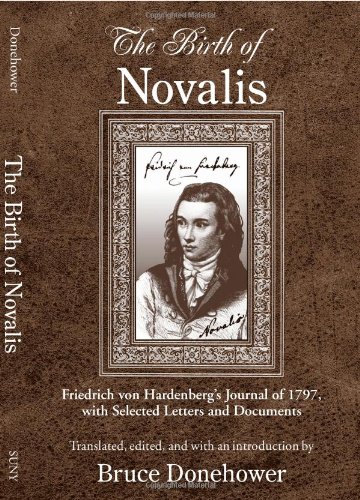The Birth of Novalis
Friedrich von Hardenberg, who later became known as the poet Novalis, kept a journal between April and July 1797 that captured his moods, thoughts, and observations following the death of his fifteen-year-old fiancée Sophie von Kühn and his dearly loved younger brother Erasmus. The journal’s short, day-to-day entries allow a frank and candid glimpse into the inner life of the maturing poet, and are complemented by selections from Hardenberg’s letters. Taken together, and read in conjunction with the fragments written before, during, and shortly after this period of time, the journal and letters shed light on a process of self-discovery during which Hardenberg became convinced of his poetic vocation and acknowledged this conviction in an act of self-christening, as the poet Novalis.

Reviews
“The Birth of Novalis … the title of which recalls the outworn image, actually dismantles the Novalis legend. This invaluable biographical collection concentrates on the engagement to Sophie von Kühn, from the poet’s meeting with the twelve-year-old to her excruciating death at just fifteen. … The diaries are filled with references to social events, to conversations, meals, walks, and so on. There are also some fairly frank notes on his sexual activity, what Novalis calls ‘the satisfaction of my fantastical desires.’” ― The Times Literary Supplement
“This book offers, for the very first time, a reliable and lucid translation into English of the most important primary sources pertaining to the biography of the German Romantic poet-philosopher Novalis. Here we glimpse the inner workings of a now legendary event: the transformation of the mining student Friedrich von Hardenberg into the romantic poet Novalis. The idea to gather letters and supporting biographical material from precisely this period and unite them into a single volume is both a masterly and welcome enterprise. It finally allows an English-speaking audience direct access to one of the most fascinating and enduring love relationships in literary history―that of Sophie von Kühn and Friedrich von Hardenberg. Donehower’s insightful introduction and thoroughly readable commentary interspersed between the letters does a great deal to separate the fact from the fiction and myth in Hardenberg’s biography.” ― David W. Wood, University of Paris IV, Sorbonne
“Making this material available in English is a great service and long overdue. It offers the materials to contextualize Novalis’ other writings, showing how his work responds to his particular biographical context (unavoidable, given the strong mythmaking surrounding Novalis’ personal losses and their fictionalizations).” ― Katherine Arens, author of Empire in Decline: Fritz Mauthner’s Critique of Wilhelminian Germany

